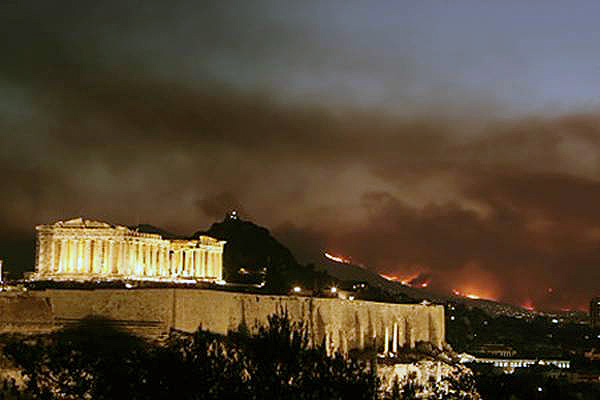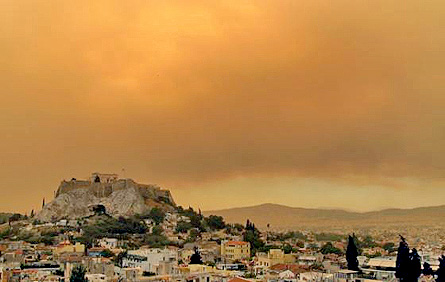Professor Blois

Source: New York Daily News
![]()
In late August 2009, six major wildfires raged in and around the suburbs of Athens, Greece for more than three days. Several American newspapers, including the Wall Street Journal, the New York Daily News, and the New York Times carried the photo above or a similar one. The Parthenon is not itself ablaze, but is illuminated in a way not dissimilar to what it must have looked like in September 480 BCE when the Persian emperor Xerxes, occupying the city, ordered Athens and the Parthenon burned to the ground. Almost all Athenians had fled the city, and they watched despairingly from a distance as their city burned. Looking at this photo, we can sense a 2500 year old event quite vividly, and can almost ask ourselves whether it is 2009 AD or 480 BC. Xerxes’ burning of Athens (on the eve of the naval battle of Salamis in which the Greeks decisively defeated the Persian fleet and made the Persian position in Athens untenable) is described below by Herodotus (often called the ‘father of history’) and by Steven Pressfield (author of the historical novel on which the movie ‘300’ was based). One long-run benefit, if we can call it that, of the 480 BC destruction of the Parthenon is that it allowed Pericles to urge reconstruction of the temple to Athena in the 440s. Though it is now a ruin, the ‘new’ Parthenon remains one of the glories of Western architecture, courtesy of Xerxes’ act of spiteful destruction. He was probably seeking to avenge the defeat of his father Darius’ invasion force at Marathon ten years earlier.
Herodotus, The Struggle for Greece. Translated by Kenneth Cavander. Fawcett Premier, 1962, page 115. They found an empty city. A few Athenians, beggars and stewards of the temple, had barricaded themselves into the Acropolis behind wooden doors, but they could provide only feeble resistance. They had been too poor to go to Salamis, and believed they had solved the puzzle of the Delphic oracle when it talked about the ‘wooden walls’ never being taken. They thought a wooden barricade was meant, not ships, and staked everything on their wooden doors. But the Persians occupied the hill opposite the Acropolis and began a siege. Winding strips of tar round their arrows and setting them alight, they fired into the stockade. Although this defense proved worthless the besieged Athenians refused to surrender; their situation was desperate, but they refused to listen to the offer of the Persians to negotiate a truce…. [The Persians] plundered the temple, destroyed everything in sight and burnt the whole of the Acropolis. Steven Pressfield, Gates of Fire. Bantam Books, 1998, page 394ff. The army of the Empire stood at that time, two hours prior to sunset, some six weeks after the victory at Thermopylae, drawn up on line within the western walls of the city of Athens. An incendiary brigade of 120,000 men there dressed at a double-arms interval and advanced across the capital, putting all temples and shrines, magistracies and public buildings, gymnasia, houses, factories, schools and warehouses to the torch. At this point His Majesty [was] on station with the fleet, which was drawing up in preparation for imminent engagement with the navy of the Hellenes, expected to commence with the dawn…. The night grew more apocalyptic with each hour. The smoke of the burning city rose thick and sulphurous across the plain; the flames from the Acropolis and the merchant and residential quarters lit the sky bright as noon. Diodorus Siculus, Library of History from book XVII (website) Alexander held games in honor of his victories. He performed costly sacrifices to the gods and entertained his friends bountifully. While they were feasting and the drinking was far advanced, as they began to be drunken a madness took possession of the minds of the intoxicated guests. At this point one of the women present, Thais by name and Attic by origin said that for Alexander it would be the finest of all his feats in Asia if he joined them in a triumphal procession, set fire to the palaces, and permitted women’s hands in a minute to extinguish the famed accomplishments of the Persians. This was said to men who were still young and giddy with wine and so, as would be expected, someone shouted out to light torches, and urged all to take vengeance for the destruction of the Greek temples…. Promptly many torches were gathered. Female musicians were present at the banquet, so the king led them all out to the sound of voices and flutes and pipes, Thais the courtesan leading the whole performance. She was the first, after the king, to hurl her blazing torch into the palace. As the others all did the same, immediately the entire palace area was consumed, so great was the conflagration. It was most remarkable that the impious act of Xerxes, king of the Persians, against the acropolis of Athens, should have been repaid in kind after many years by one woman, a citizen of the land which had suffered it, and in sport. Michael Wood, In the Footsteps of Alexander the Great. University of California Press, 1997, page 114. To us, it is a crucial psychological moment in Alexander’s story. What was he up to? Was it an accident? Or deliberate vandalism? Can the story about Thais be true? There is general agreement today that the palace was deliberately destroyed, but a new examination of the archaeological evidence for the fire has suggested a systematic firing of Xerxes’ rooms rather than the haphazard work of drunken revelers. What does that tell us? Maybe Alexander was letting the Greeks at home know he had not forgotten his mission of pan-Hellenic vengeance…. Perhaps, too, Alexander was saying to the Persians, this is the end of your time; my time has begun now.
|

This
page is copyright © 2009-11, B. Blois and C.T. Evans
For information contact cevans@nvcc.edu